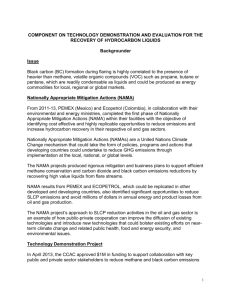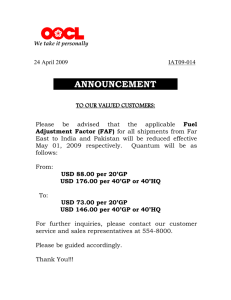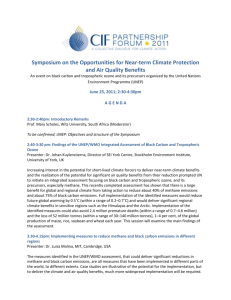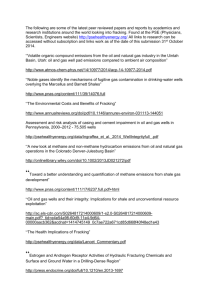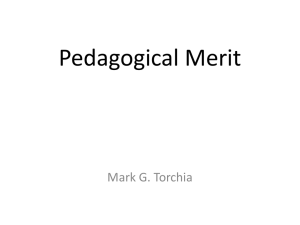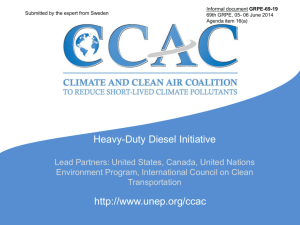New Factsheet - Waste 1.2 web
advertisement
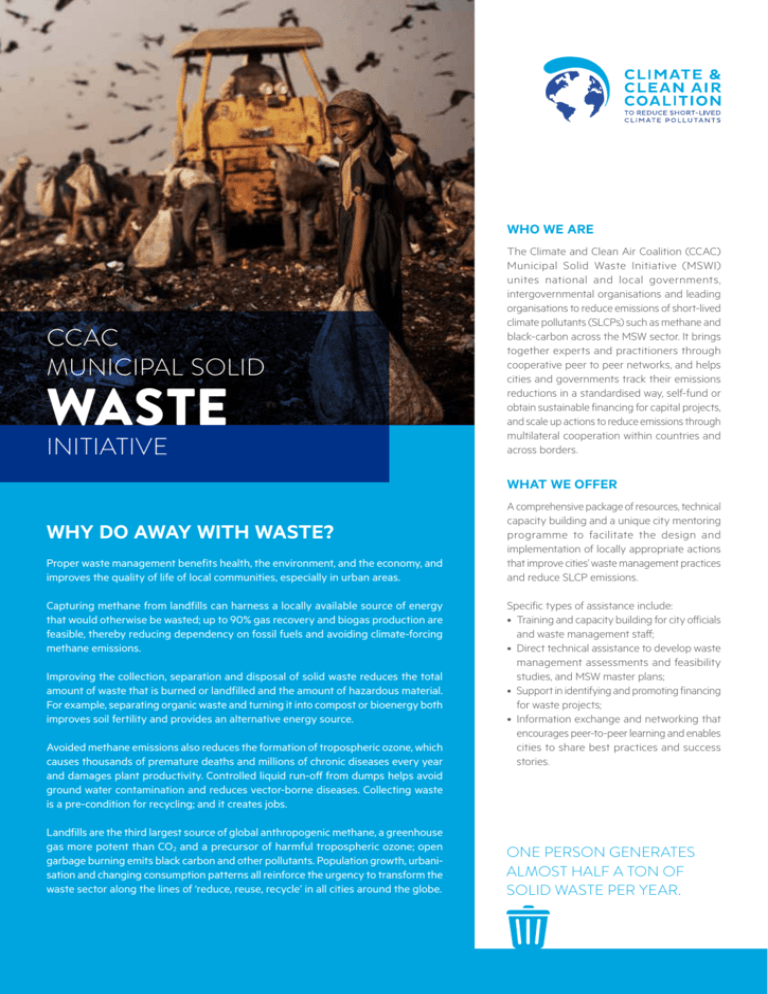
WHO WE ARE CCAC MUNICIPAL SOLID WASTE INITIATIVE The Climate and Clean Air Coalition (CCAC) Municipal Solid Waste Initiative (MSWI) unites national and local governments, intergovernmental organisations and leading organisations to reduce emissions of short-lived climate pollutants (SLCPs) such as methane and black-carbon across the MSW sector. It brings together experts and practitioners through cooperative peer to peer networks, and helps cities and governments track their emissions reductions in a standardised way, self-fund or obtain sustainable financing for capital projects, and scale up actions to reduce emissions through multilateral cooperation within countries and across borders. WHAT WE OFFER WHY DO AWAY WITH WASTE? Proper waste management benefits health, the environment, and the economy, and improves the quality of life of local communities, especially in urban areas. Capturing methane from landfills can harness a locally available source of energy that would otherwise be wasted; up to 90% gas recovery and biogas production are feasible, thereby reducing dependency on fossil fuels and avoiding climate-forcing methane emissions. Improving the collection, separation and disposal of solid waste reduces the total amount of waste that is burned or landfilled and the amount of hazardous material. For example, separating organic waste and turning it into compost or bioenergy both improves soil fertility and provides an alternative energy source. Avoided methane emissions also reduces the formation of tropospheric ozone, which causes thousands of premature deaths and millions of chronic diseases every year and damages plant productivity. Controlled liquid run-off from dumps helps avoid ground water contamination and reduces vector-borne diseases. Collecting waste is a pre-condition for recycling; and it creates jobs. Landfills are the third largest source of global anthropogenic methane, a greenhouse gas more potent than CO2 and a precursor of harmful tropospheric ozone; open garbage burning emits black carbon and other pollutants. Population growth, urbanisation and changing consumption patterns all reinforce the urgency to transform the waste sector along the lines of ‘reduce, reuse, recycle’ in all cities around the globe. A comprehensive package of resources, technical capacity building and a unique city mentoring programme to facilitate the design and implementation of locally appropriate actions that improve cities’ waste management practices and reduce SLCP emissions. Specific types of assistance include: • Training and capacity building for city officials and waste management staff; • Direct technical assistance to develop waste management assessments and feasibility studies, and MSW master plans; • Support in identifying and promoting financing for waste projects; • Information exchange and networking that encourages peer-to-peer learning and enables cities to share best practices and success stories. ONE PERSON GENERATES ALMOST HALF A TON OF SOLID WASTE PER YEAR. AMBITIONS • B y December 2015, 50 cities globally will commit to develop and implement quantifiable plans of action to reduce eSLCPs from the waste sector by 2020; • By December 2020, expand the global city network to reach an additional 100 cities; • The initial 150 cities that join the initiative by 2020 will motivate another 1,000 cities to act. • M SW City network of 70 cities; • City baseline assessments of the waste situation developed for 30 cities; • Work plans developed for 16 cities; • Composting case studies for 6 countries: Bangladesh, Brazil, Ghana, Sri Lanka, and Uganda; • City Mentoring programme to facilitate peer-to-peer learning; • E-module on organics processing and landfill management, including webinars on composting, landfill-gas-collection and waste collection, workshops, and a dedicated online platform; • Emissions Quantification Tool to identify suitable city-level alternative solutions and define climate friendly waste management systems; • Results-based funding mechanism piloted in Penang/Malaysia; • L andfill-gas financing handbook. MUNICIPAL SOLID WASTE NETWORK The initiative is open to cities, governments, organisations, and private sector to get engaged and take action to reduce SLCPs from the waste sector. FUNDING Total approved funding from the CCAC Trust Fund: USD 4,223,000 ity Work Plans C USD 1,126,999 ity Assessments C USD 488,053 ools and Training T materials USD 672,778 orkshops and W Conferences USD 899,170 Implementation and Business Plans USD 860,000 ity and Expert C Exchanges USD 176,000 Participating cities with Waste Assessments developed or underway P articipating cities with Waste Assessments and Action Plans developed or underway City to City Cooperation: Viña del Mar/Chile with Stockholm/Sweden; Cali/Colombia with San Diego,/USA; Cebu City/Philippines with Kitakyushu City/Japan; and SaoPaolo/Brazil with Copenhagen/Denmark Lead partners of the MSWI: Governments of Canada, Japan, Mexico, United States; UN Environment Programme, World Bank, International Solid Waste Association and C40 Cities Climate Leadership Group. ABOUT THE CCAC MORE INFORMATION The Climate and Clean Air Coalition to Reduce Short-Lived Climate Pollutants (CCAC) is a voluntary global partnership of governments, intergovernmental organizations, business, scientific institutions and civil society committed to catalysing concrete, substantial action to reduce SLCPs (including methane, black carbon and many hydrofluorocarbons). The Coalition works through collaborative initiatives to raise awareness, mobilise resources, and lead transformative actions in key emitting sectors. www.ccacoalition.org/en/initiatives/waste WWW.CCACOALITION.ORG ccac_secretariat@unep.org @CCACoalition facebook.com/ccacoalition December 2015 Virginia R. Bozzo, Mayor of Viña del Mar RESULTS SO FAR Developing an Integrated Waste Management Plan for Viña del Mar has immense value to our city. We have reason to hope that we can make significant progress in reducing emissions, improve the environmental quality of our community, and improve the quality of life of our citizens.
